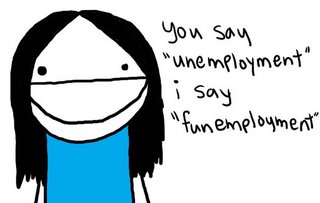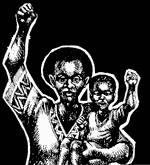
This post was inspired by
Nneka's post, which was inspired by
Pilgrimage to Self.This is a good question, W
hat is my dream job and what motivates me to work and wake up in the morning these days? Dream Job
In the morning, heading off to my dream job as an internationally trained lawyer, now one of 95 International Criminal Court Judges at The Hague (following the "One from One Region" policy), I would be starting off by going to the gym, or running outdoors, doing 2 hours of exercise from 5am-7am. From 7am-8:30am I would flip through 7-10 different newspapers/RSS feeds/online journals in order to inform myself of what is going on in the world today. I would drink green tea with some honey and have a platter of fruit, prepared for me by my loving husband - because it is his turn that week.
I would have my oldest daughter/son drive the younger children to school and I would make sure to tell them to drive safely because I just read on the news that it will be a busy day on the street - people are out celebrating: It is World Independence & Freedom from Terrorist and Corrupt Government's Day (WIFTCGD) and I was one of the people who forwarded this idea to the Council at the Hague, which in turn, submitted the proposal to the Powers That Be (PTB = African Union). The world is celebrating with Africans today.
As I have built centres of learning all over the African continent, in 5 regions: North East, North West, Central, South East, South West (and one for Madagascar), with scholars and workers of all sorts coming to develop their skills in the compulsory course, "Participatory Learning & Decision Making: Enacting Human Rights", I will be flying daily to teach a course in "Regional peace-building: lessons from the failed state-building model of the West". These centres of learning may be built by me but they are replicated by other leaders all over the continent - bearing different names in different sub-regions. There is continental unity in terms of economic and political cooperation.
So, my dream job would require that I dress suitably. As I like to be versatile, I will wear cotton Indian sari's when it is particularly hot outside and sometimes I will wear the brand name of prominent African designers, such as Horn of Africa Queen Fashions - "Clothes for the Everyday." (You see, economic transactions across continent have facilitated greater regional access to textiles of all different colours and styles - makes for an interesting wardrobe.)
Today I will wear a deep chocolate brown dress with gold accents - gold hoop earings, gold pendant bearing the profile of Nefertiti, gold ring, etc. I wear my Egyptian Musk perfume and have unbelievably flawless skin with my smile as the greatest accessory of all. The price of gold has gone down recently as supplies have increased following the excavation and findings of gold reserves off the coast of the Red Sea. But I wear the gold anyway because status through style means nothing to me; rather I feel a sense of solidarity and pride with the Red Sea people's on their recent findings.
My central office workspace is not actually "The Hague" but it is in various AU offices scattered across the continent. The AU has many property and other investments, held in safe Nigerian banks, therefore they are able to fund and pass my recent project proposal - yearly administrative costs and "peace-keeping" missions are no longer about securing EU and other funding from abroad. When the American dollar crashed and the Chinese became the next Hegemon, the Africans slowly became quite wealthy as the Chinese outsourced much of their labour to the Continent. The Chinese created a stronger and flourishing middle class as the Africans began to own more and more of their own industries - the effect of responsible Chinese investment in Africa. They give the loan and we make and sell the product.
Yes, I helped with the General Agreement on Chinese and African Relations (GACAR) and I also was Principal Researcher on the WHTG/NA? Project (What Happened to Globalization/North America?) Project.
I travel back and forth to Brazil, Cuba, "Failed States" (Former U.S. & Britain) and the remaining "middle powers": India, Canada (yes, we're still here) and Australia. I work simultaneously with the "New Elites" in many countries. These elites have had at least 10 years of subsistence farming experience in regional co-ops and 2 of them must have been spent managing. Others able to join the "New Elites" group are workers, trade unionists, community activists, bloggers and independent media personalities. The Old Elites are being retrained in the aformentioned centres of learning in the multidisciplinary topics of "Participatory Learning and Decision-Making: Enacting Human Rights" - their competency in this compulsory course will indicate and determine their required further studies in order to complete the program. There are two academic/vocational streams: "Re-Considering Crime & Corruption" and "Lessons for Liars".
My Dream Job is filled with hope and passion and love for citizens of this world, free from hegemonic orders and destructive consequences for not following them. My Dream Job is filled with competent and productive people who disagree daily but feel the authority of the majority is good enough for them to re-think their position. If they still disagree, they appeal their case to my office which will file it in sequence with the other Appeals for Better and New Ideas.
My day ends with my thoughtful husband taking the kids to soccer practice, in the great big soccer field near our home where hundreds of kids from many different backgrounds come to play and watch soccer. My husband pours me some hot tea from the Ter-mos (Made in Zimbabwe). It is a cold night but the warmth of the soft yellow lights from the field and the smiles and laughter from the children and their families keep me comfortable.
This has been a busy day. I am jet-lagged and tired but my husband would like to, you know, when we get home.... :) I tell him I am tired and he understands completely, massaging my shoulders from a day couped up at the office, straining my neck...
...maintaining global justice is difficult indeed.
My dream job is also my dream life: a bit utopic but nonetheless possible.









